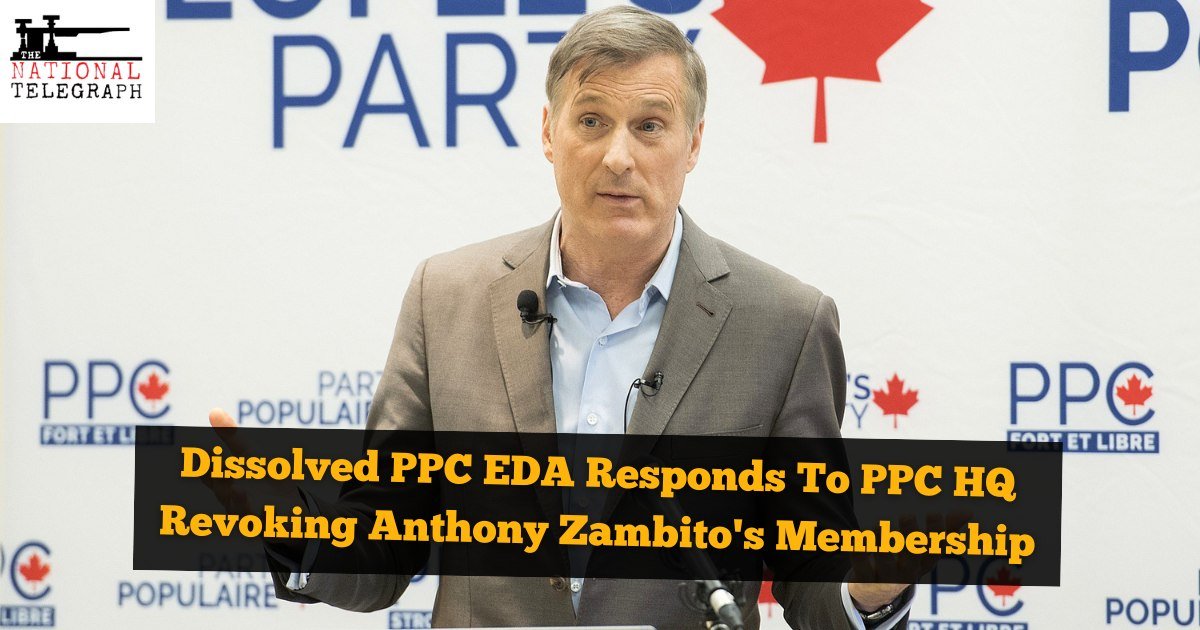Written By The National Telegraph, Posted on December 9, 2022

(The following article was written by a member of the former PPC EDA for Hastings-Lennox and Addington before it was dissolved by PPC HQ. This article acts as an open letter in response to Anthony Zambito’s op-ed in The National Telegraph talking about the PPC grassroots not being respected by PPC HQ, and also as a response to Zambito later having his PPC membership revoked for having written the article.)
Anthony Zambito’s article in the National Telegraph presents the facts to the general public. His effort was done to reach all the members of the People’s Party of Canada (PPC) due to the party’s national administration taking steps to inhibit communication between party members. Hopefully, most members of the PPC will read the article and be encouraged to speak up and get the party leader and party national administration to accept the fact that they are paid by the members of the PPC, so they should work for the members of the PPC and not against them.
A “party” is defined as a “group” gathered for a special purpose or task. “Politics” and “policy” have the same meaning. A “political party” is a “policy group” gathered for the purpose of developing policies for governance and providing a democratic process to deal with legislation in accordance with those policies. Without a constitution and democratic process in place, the PPC cannot function as a party (group). A PPC decision can only be made when a collective agreement has been made through a democratic process that enables all members of the PPC to have their say.
Because a constitution and democratic process for the PPC has never existed, a collective agreement of the party members has never been obtained; thus, there have never been any decisions made by the PPC. All decisions have been made by the party leader. All directives given to the party national administration have been made by the party leader. All policies presented have been made by the party leader since they have never been reviewed, revised, and approved by the members of the PPC.
The party leader is the only person with the authority to have Elections Canada deregister an electoral district association (EDA) of the party. Therefore, the party leader is solely responsible for the unjust deregistration of PPC EDAs for trying to establish a constitution for the PPC. It is evident, the party leader does not want to have a constitution and democratic process for the PPC as shown by the unjust actions he has taken against the members of the PPC.
All political party leaders should consider that taking payment from people for memberships that are supposed to give them democratic participation in the party, then not allowing them that democratic participation for which they paid, is fraud. In the criminal code of Canada, part X, section 380 (1), states that everyone who, by deceit, falsehood, or other fraudulent means, whether or not it is a false pretense within the meaning of this Act, defrauds the public or any person, whether ascertained or not, of any property, money or valuable security or any service, is guilty of an indictable offence.
Anthony Zambito also mentioned in his article, that the same unjust treatment by political party leaders and party administrations is taking place in other political parties and not just the PPC. The Constitution of Canada does not recognize political parties. The Constitution of Canada specifies that the nation’s electoral system divides the country into electoral districts with each district entitled to have one representative elected to the House of Commons. By Canada’s single-member plurality (SMP) electoral system, citizens vote directly for their members of parliament and not for a political party. An elected member of parliament (MP) does not have any legal obligations to any political party or party leader. MPs are accountable to the constituents of their electoral districts and should always vote in parliament in accordance with the consensus of their constituents.
Political parties are recognized in the Parliament of Canada Act. For all MPs to debate at the same time in parliament is unmanageable. However, reviewing legislation in party caucus meetings, then having the party leader or another member of the caucus speak for the group, makes debates much more manageable. This is the true role of political parties, to assist the democratic process and not to inhibit it, as many political parties are presently doing.
How Canada should be governed is defined in the Constitution of Canada. Politicians should uphold the Constitution and stop inhibiting the democratic process. Like Anthony Zambito, all Canadians should insist that our politicians uphold the Constitution of Canada and protect our constitutional democracy.
Very well presented. Every quote was awesome and thanks for sharing the content. Keep sharing and keep motivating others.